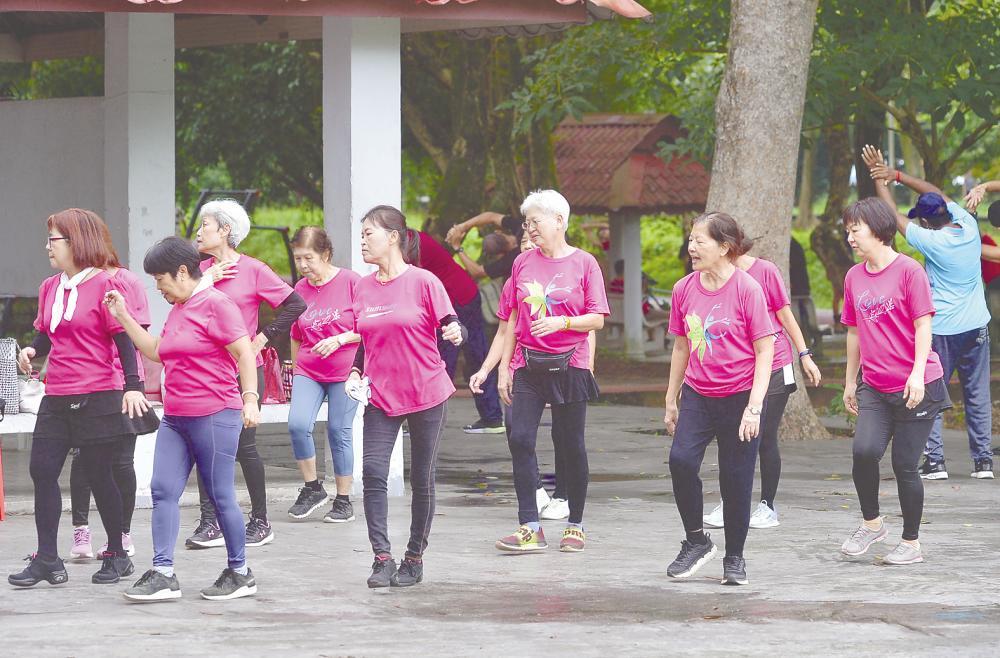PETALING JAYA: An expert in ageing has urged senior citizens to become more active to improve their physical and psychosocial well-being, rather than focusing on the absence of illness.
Universiti Kebangsaan Malaysia Centre for Healthy Ageing and Wellness lecturer
Prof Dr Devinder Kaur Ajit Singh said
3.5 million Malaysians are aged over 60.
“Projections indicate that older adults will make up over 15% of our 34.1 million population by 2030. This means active ageing has become increasingly important in our society.”
She defined active ageing as a holistic approach that focuses on optimising health, staying involved in meaningful activities and feeling secure as people age.
“It aims to help older adults stay healthy, engaged and secure, while recognising their ongoing contributions to society. By addressing their physical, social and economic needs, active ageing improves their quality of life, reduces healthcare costs and supports long-term well-being.”
She said active ageing challenges stereotypes that view older adults as unproductive or unable to grow, highlighting their ability to learn, grow and maintain a healthy body and mind, and emphasising their unique skills and experiences.
University Malaya Medical Centre and Specialist Centre consultant geriatrician
Prof Dr Shahrul Bahyah Kamaruzzaman said older Malaysians often face barriers such as limited access to affordable healthcare, social isolation and inadequate mobility-friendly infrastructure.
He said chronic health conditions such as diabetes and arthritis restrict physical activity and impact overall well-being, making maintaining an active and healthy lifestyle difficult as they hinder the potential of older adults to live fulfilling lives.
“Programmes such as Pusat Aktiviti Warga Emas run by the Women, Family and Community Development Ministry offer essential support, including spaces for social interaction, health checkups and recreational activities.
“The centres help older adults stay connected, active and purposeful, combating social isolation while fostering a sense of community,” said Shahrul Bahyah, who is also Malaysian Healthy Ageing Society (MHAS) president.
MHAS honorary secretary Dr Sangeeta Kaur said there needs to be more community-driven solutions that emphasise social participation and inclusion.
“Engaging older adults in activities that promote health and social interaction could significantly improve their quality of life.”
She said to support active ageing, it is vital to encourage physical activity tailored to individual needs.
Shahrul Bahyah said MHAS is dedicated to promoting active ageing and improving the well-being of older adults in Malaysia.
It aims to expand its outreach to underserved communities, strengthen partnerships with government bodies and NGOs, and increase public awareness on the importance of healthy ageing, apart from collaborating with local and global partners to ensure its programmes reach those in need.
“The public can support MHAS by participating in our programmes, volunteering and advocating age-inclusive policies. Through collective efforts, MHAS hopes to build stronger and more supportive communities.”
Devinder Kaur recommended a balanced approach that includes cardiovascular exercises such as walking and swimming, aiming for at least 150 minutes of moderate activity per week.
“Strength training using resistance bands or bodyweight exercises helps maintain muscle and bone health while balance exercises such as tai chi and yoga reduce the risk of falls and improve coordination.
“Flexibility exercises such as stretching are important to prevent stiffness and injuries.
“Starting an exercise routine later in life could lead to significant health benefits. Any physical activity is better than none.”
She said active ageing benefits individuals by improving physical and mental health, independence and quality of life.
“A more active older population contributes to reduced public healthcare costs, lower caregiver burdens and stronger social cohesion.
“By fostering positive attitudes and building supportive communities, we empower older adults to stay active, keep learning and continue to contribute meaningfully to society.”









